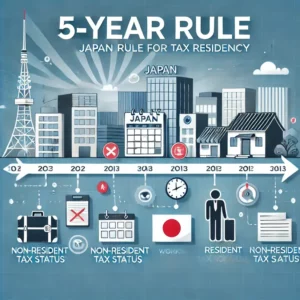The 5 year rule in Japan is a material component of tax residency and system for foreign asset reporting.
It backs the government’s attempts to improve adherence and transparency among the nation’s wealthy citizens.
This rule requires investors to carefully arrange their offshore investments. When determining the limits of their reporting responsibilities, permanent residents must take the aggregate amount of their foreign assets into account.
If you are looking to invest as an expat or high-net-worth individual, which is what I specialize in, you can email me (advice@adamfayed.com) or WhatsApp (+44-7393-450-837).
This includes if you are looking for alternatives or a second opinion.
Some of the facts might change from the time of writing, and nothing written here is formal tax advice.
For updated guidance, please contact me.
Tax Rate in Japan for Foreigners
Japan tax system for foreigners is based on residency status, which has a big impact on tax liabilities.
Taxpayers who are not residents pay a fixed rate of 20.42% on their income, including job remuneration, that comes from sources in Japan. Such rate includes a 2.1% national income tax surtax, as per PwC.
Non-permanent residents pay taxes on their income earned in Japan as well as any money received from outside the country and sent to Japan. Their progressive tax bills are comparable to those for permanent residents, but they are exempt from being levied on foreign income that is not brought into Japan.
Meanwhile, permanent residents pay progressive taxes ranging from 5% to 45% on their global income depending on their earning bracket.
What is Japan 5 year rule for tax?

The rule applies to tax resident status, especially for expats. A non-Japanese resident is considered a non-permanent resident under this criterion if they have lived in Japan for fewer than five years in the previous decade.
There are important tax consequences associated with this classification:
Only income earned in Japan and money sent to Japan from outside the country is subject to taxation for non-permanent residents. After five years or longer in Japan, they are considered permanent residents and must pay taxes on their earnings globally.
The five-year timeframe is determined by adding up all of the time spent in Japan over the past 10 years.
Interestingly, despite residency status, capital gains from the disposal of listed foreign equities owe taxes in Japan even prior to the five-year period.
This provision can offer a substantial tax benefit to those who intend to stay in Japan for fewer than five years. It permits them to sidestep taxes on overseas income unless it gets brought into the country.
Overseas assets reporting requirements
Japan’s five-year rule affects how foreign assets are reported, especially for those who are considered permanent residents.
Foreign assets worth more than 50 million yen as of end-December of the previous year must be reported by permanent residents, according to PwC. This report, which is distinct from ordinary income tax returns, must be sent in to the Japanese tax authorities by end-June of the subsequent year.
PwC said resident taxpayers who have global assets and liabilities totaling more than 1 billion yen as of end-December are required to report them too by the same deadline.
So, if individuals have assets abroad that are worth more than 50 million yen, they must declare those; if their entire assets globally top 1 billion yen, they report that amount as well.
The goal of the requirement is to provide the tax office with a thorough understanding of a person’s worldwide wealth so that any taxes owed may be better tracked.

It is possible to successfully manage the reporting duty for non-Japanese persons temporarily residing in Japan, particularly if they hire a local tax advisor or accountant.
Remember that taxes are only assessed when gains are realized from foreign assets; simply having them does not result in a tax obligation.
Should a person opt to depart from Japan with unrealized profits on assets worth more than 100 million yen, they can reportedly be slapped by an exit tax.
Japan tax penalty
There are severe consequences for failing to disclose foreign assets, like up to 500,000 yen in fines or even jail time for deliberate evasion.
To increase its surveillance efforts, the Japanese tax authority has implemented systems that mandate banks to record large overseas transactions and provide tax officials the ability to examine bank accounts without prior authorization.
The My Number system is one of the many methods the government uses to keep an eye on financial activity and guarantee compliance.
Final Thoughts
You are required to reveal comprehensive information about your foreign holdings, which may have an impact on your investing methods, if your overall assets surpass certain threshold.
You may decide to trim foreign assets or reorganize your holdings to stay below the reporting requirement.
Decisions about moving investments, using offshore accounts, or leaving Japan early may all be impacted by the 5-year rule, which has a big impact on foreigners’ tax residence and reporting requirements.
This rule requires high-net-worth individuals and expats to prepare carefully.
Pained by financial indecision?

Adam is an internationally recognised author on financial matters with over 830million answer views on Quora, a widely sold book on Amazon, and a contributor on Forbes.



